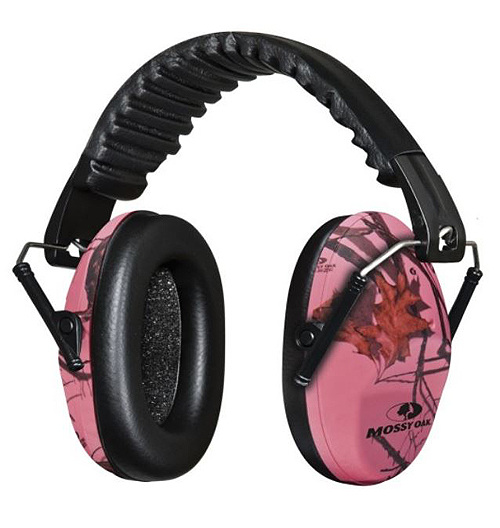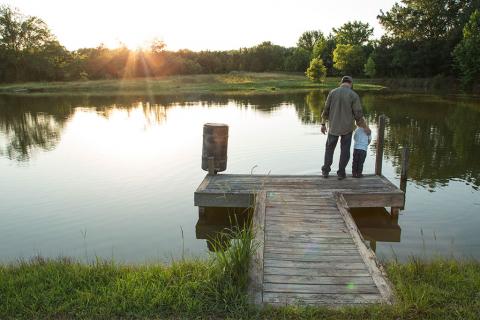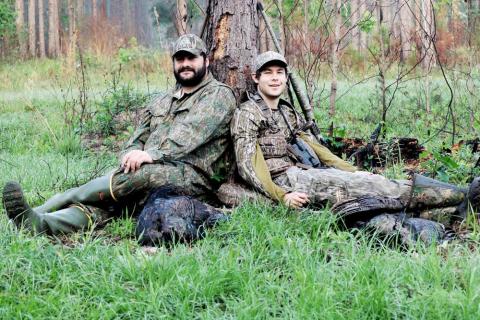The correct handling of firearms is the first thing that comes to mind for most people when they think of hunting safety.
However, a safe and sensible approach to hunting involves more than just considering how to manage your firearm. It also means you need to consider how to handle your own health and well-being.
Protecting both your ears and your eyes is a fundamental part of hunting safety and ensuring they are well-protected can help you continue enjoying a lifetime of good health and good hunting.

Understanding hearing loss
The American Speech-Language-Hearing Association emphasizes that being exposed to the noise of firearms can be potentially hazardous for your hearing health.
When you go hunting, it is important to understand the very real risk to your hearing, though many hunters may not be fully aware of it. Any sound that reaches 140 dB or more can cause permanent damage to your hearing. Considering that even a .22 caliber rifle can reach this noise level, it is likely your hearing is at risk.
Big bore rifles and pistols can produce sound at extremely high levels, with some reaching more than 175 dB. Essentially, this means that a single gunshot can accrue severe hearing loss.
Every loud sound your ears are exposed to without proper ear protection will damage the sensitive hairs of the inner ear that detect vibrations and translate them into noises for the brain.
Once these hairs are damaged, they do not grow back again, resulting in irreversible damage. Exposure to loud noises and the long-term harm can leave you with an inability to hear high frequencies as well as other unpleasant side effects, such as tinnitus.
Remember, although hearing loss can be assisted through the use of hearing aids, it can never be repaired! Taking the time to consider what precautions you can take to avoid any damage to your ears is well worth maintaining your hearing health in the long run.
 Passive ear protection
Passive ear protection
Simple and affordable reusable earplugs provide a lightweight and convenient option for protecting your ears. Ridges ensure the earplugs stay in place and flexible cords are often included to attach them and prevent loss.
These are a good choice for those who are looking for a budget-friendly, uncomplicated option. In-ear plugs provide you with passive hearing protection, which simply muffles noise and reduces the decibel level reaching your ears.
Passive ear protection also includes non-electronic earmuffs, which come in a range of designs to suit all tastes, including those designed especially for women. Not only are earmuffs easy to use, but they also protect the sensitive bones behind the eardrum. Some people find the over-the-ear design to be more comfortable than their in-ear counterparts, and they also offer additional comfort for shooting in the winter months or colder climates.
Active ear protection
Passive ear protection tends to be relatively inexpensive and easy to replace, but due to their simpler design, they cannot differentiate between noises. This means that along with the sounds of your shotgun, surrounding ambient noises are also muffled.
Active ear protection is an alternative option for those who spend more time at the shooting range or in the field.
For more complete and convenient ear protection, opt for a set of electronic earmuffs. Electronic earmuffs protect your hearing, but they also allow you to hold a normal conversation while you are wearing them.
These devices make softer sounds louder while screening out loud noises, including gunfire. Because of this, they afford a better awareness of your surroundings and other hunters who might be in the vicinity, helping you to avoid potential shooting accidents.
Electronic earmuffs are a worthwhile investment for any committed hunter, particularly those who hunt through various seasons and climates.
Keep your eyes covered
When it comes to hunting safety tips, the need for a pair of shooting glasses is at the very top of the list, even though many hunters neglect to obtain proper eyewear.
Shooting glasses protect your eyes from any materials that might ricochet in your direction. They also prevent any powder, debris or dirt from reaching your eyes if a firearm happens to malfunction.
High-quality hunting glasses can do an excellent job of protecting a hunter’s eyes from impact in a manner that standard sunglasses simply cannot.
Choose a pair of glasses from a reputable brand that feature lenses made of impact-resistant polycarbonate, as these will ensure you are also protected from the danger of falling pellets.
Hunting glasses come in a range of interchangeable colored lenses to give you the option of choosing the color that best suits your hunting conditions. When the sun is at its brightest, for example, you will need a darker lens to see clearly whereas hunting on a cool and cloudy day requires lighter lenses.
In addition to protecting your eyes, safety glasses can improve your shooting accuracy. This is because certain lens colors can enhance your depth perception and increase visual acuity.
Be responsible at all times

To optimize hunting safety, it is essential that you understand your gun inside and out.
Always read the instruction manual of any new firearm carefully before using it. Ahead of loading or firing any gun, find the safety and make sure you understand exactly how it operates.
It is best to learn how to load and unload your new firearm in a secure, non-pressured environment.
Keeping your firearm clean and clear of debris at all times is essential. Be conscientious and always ensure the barrel is clear of dirt, dust and mud before firing.
Clean the firearm before and after using it by running a soft, microfiber cloth down the barrel with a proper cleaning rod. Bear in mind that even a tiny obstruction can cause a breach or the barrel to explode.
Never operate a firearm when you are under the influence of alcohol or drugs. Remember this includes any prescription medications you may be taking that can impair reaction times or leave you feeling lethargic. If you have any doubts about the effects a drug might have, it is always best to err on the side of caution and save your hunt for another day.
It pays to check twice
When it comes to hunting, being overly-cautious ensures you are being cautious enough. Always double and triple check that your firearm is unloaded and never climb a ladder or a tree with a loaded gun.
Remember that safety starts long before you are out in the field, as the majority of firearm accidents occur in the truck while the gear is being loaded and unloaded.
If you are a seasoned hunter, take the time to remind yourself of the basics and share your hunting safety tips with the younger generation.
By following these simple hunting safety rules, you’ll ensure you can enjoy the sights and sounds of the great outdoors for many years to come.

 Passive ear protection
Passive ear protection




























